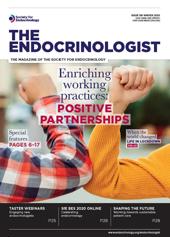Both the NHS Constitution1 and NHS England’s 2014 Five Year Forward View2 prioritised partnership working, not only between care providers, but also through developing partnerships with individual patients and with patient groups. The latter were cited as a route through which to enhance service development. The Nursing and Midwifery Council’s Code of Conduct3 also behoves all nurses to work in partnership with people to help ensure effective care delivery.
THE PITUITARY FOUNDATION
As long ago as 1994, a partnership between the Society for Endocrinology, senior endocrinologists (notably John Wass and Stafford Lightman) and motivated patients emerged and created The Pituitary Foundation. Initially intended to support those diagnosed with diabetes insipidus, the need for support for the whole of pituitary disease very soon became clear.
Our first office was provided by the Society for Endocrinology at their building in Bristol, highlighting the commitment and drive for a patient-led, medically supported organisation to succeed. Although we have now grown within our own offices, still based in Bristol, we rely heavily on the continuance of valuable partnerships through our medical committee and network of healthcare professionals. They are a source of expertise in answering the ever-increasing, complex questions asked of us by patients all over the world.
Patients were supported to launch local groups and so develop peer support in regional areas. Continued partnership with endocrinologists led to many of these groups having ‘their’ endocrinologist as a speaker at their meetings. This allowed the sharing of information and experience not normally given in a clinic setting. Through this, a better understanding of each party developed and localised service improvement could take place. The Pituitary Foundation now has over 35 local support groups across the UK, with thousands of people accessing support locally each year.
By working with The Pituitary Foundation, patients have access to information based on current best practice and evidence, presented in easily understood formats and supported by a range of helpline services.
The ready availability of this information outside clinic hours, and particularly now online via our website, allows patients to be knowledgeable when attending clinic and participating in their shared decision-making discussions around their care.
THE NEED FOR PARTNERSHIPS
As a former NHS endocrine clinical nurse specialist, I remember the days before The Pituitary Foundation. Patients would attend the investigation unit I worked at for post-pituitary surgery testing, with little or no knowledge of why they were there or what was to happen. Follow-up plans were fluid and appointments often rearranged. This meant patients not receiving diagnosis for several months after initial testing.
There were also safety issues: patients did not understand the emergency steroid cover needed for intercurrent illness. Many were admitted to local hospitals with adrenal crisis in the period between surgical discharge and pituitary function testing.
Being able to refer patients to The Pituitary Foundation for advice and support proved invaluable, as I developed the role of the endocrine clinical nurse specialist. Having patients better informed regarding their potential diagnosis, and possible investigations, meant my time with them could be used in a more focused way. I could get to understand their individual needs and check their understanding of the information, rather than starting from scratch, and so develop individual partnerships.
PARTNERSHIPS BETWEEN PATIENTS

A Pituitary Foundation patient meeting. Credit: The Pituitary Foundation
With the advent of the local support group in 1996, I found my patients became just that – a group. So many reported how good it was to meet other people in similar situations, as they had felt alone for a long time.
This still holds true today. Although many more centres now have an endocrine nurse, patients continue to value peer support, in a setting where they can feel safe and have their day-to-day difficulties recognised and fully understood by others who have similar lived experiences. Many patients now also connect online with each other through the charity’s social media channels.
THE BREADTH OF OUR WORK
The work done by The Pituitary Foundation would not be possible without our partnership with the Society for Endocrinology, senior endocrinologists, nurses and endocrine teams throughout the country.
Our patient publications are reviewed by our medical committee, ensuring the information they contain is pertinent and current, and we rely on those connections to help deliver our national conference for patients.
Our dedicated helplines are receiving more calls, emails and texts than ever, with a record 2730 enquiries in 2019.
‘The work done by The Pituitary
Foundation would not be possible without
our partnership with the Society for
Endocrinology, senior endocrinologists,
nurses and endocrine teams throughout
the country.’
As a patient-focused organisation, we regularly hear from our members about the challenges they face in receiving quality healthcare. We have collaborated on several projects to hear the patient voice (e.g. Cushing’s disease and diabetes insipidus), with survey/questionnaire feedback results passed to the Society for Endocrinology and the NHS England Clinical Reference Group for Specialised Endocrinology, to help inform and drive change where possible for patient benefit.
We highlight significant safety concerns, such as deaths from diabetes insipidus. We also have an annual campaign during the month of October to raise awareness of pituitary disease. These awareness months/campaigns are targeted at GPs/hospitals and the general public.
It is without doubt that this partnership between The Pituitary Foundation, as a patient group, and medical professionals has had a positive impact on the lives of many thousands of patients over the years. Collaborations and partnerships like this should be at the heart of all multi-disciplinary ways of working, to help ensure effective care delivery for patients.
PAULINE WHITTINGHAM
Endocrine Specialist Nurse, The Pituitary Foundation
REFERENCES
- Department of Health & Social Care 2015 NHS Constitution for England www.gov.uk/government/publications/the-nhs-constitution-for-england.
- NHS England et al. 2014 Five Year Forward View www.england.nhs.uk/wp-content/uploads/2014/10/5yfv-web.pdf.
- Nursing & Midwifery Council 2015 The Code www.nmc.org.uk/globalassets/ sitedocuments/nmc-publications/nmc-code.pdf
Find out more about The Pituitary Foundation








